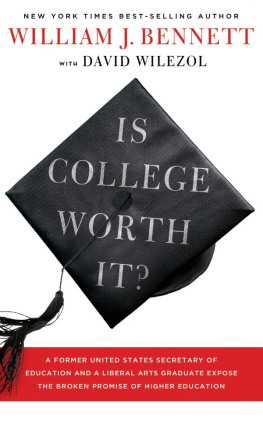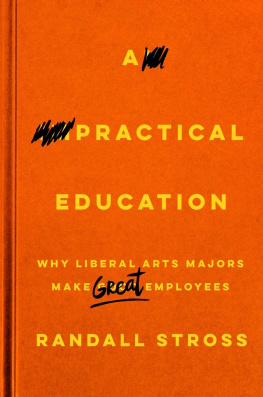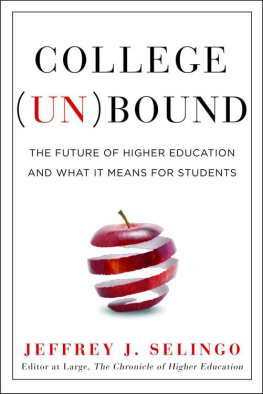Dr. William J. Bennett - Is College Worth It?
Here you can read online Dr. William J. Bennett - Is College Worth It? full text of the book (entire story) in english for free. Download pdf and epub, get meaning, cover and reviews about this ebook. City: Nashville;TN, year: 2013, publisher: Thomas Nelson, genre: Politics. Description of the work, (preface) as well as reviews are available. Best literature library LitArk.com created for fans of good reading and offers a wide selection of genres:
Romance novel
Science fiction
Adventure
Detective
Science
History
Home and family
Prose
Art
Politics
Computer
Non-fiction
Religion
Business
Children
Humor
Choose a favorite category and find really read worthwhile books. Enjoy immersion in the world of imagination, feel the emotions of the characters or learn something new for yourself, make an fascinating discovery.
- Book:Is College Worth It?
- Author:
- Publisher:Thomas Nelson
- Genre:
- Year:2013
- City:Nashville;TN
- Rating:3 / 5
- Favourites:Add to favourites
- Your mark:
- 60
- 1
- 2
- 3
- 4
- 5
Is College Worth It?: summary, description and annotation
We offer to read an annotation, description, summary or preface (depends on what the author of the book "Is College Worth It?" wrote himself). If you haven't found the necessary information about the book — write in the comments, we will try to find it.
Is College Worth It? — read online for free the complete book (whole text) full work
Below is the text of the book, divided by pages. System saving the place of the last page read, allows you to conveniently read the book "Is College Worth It?" online for free, without having to search again every time where you left off. Put a bookmark, and you can go to the page where you finished reading at any time.
Font size:
Interval:
Bookmark:

IS
COLLEGE
WORTH
IT?
2013 by William J. Bennett and David Wilezol
All rights reserved. No portion of this book may be reproduced, stored in a retrieval system, or transmitted in any form or by any meanselectronic, mechanical, photocopy, recording, scanning, or otherexcept for brief quotations in critical reviews or articles, without the prior written permission of the publisher.
Published in Nashville, Tennessee, by Thomas Nelson. Thomas Nelson is a registered trademark of Thomas Nelson, Inc.
Thomas Nelson, Inc., titles may be purchased in bulk for educational, business, fund-raising, or sales promotional use. For information, please e-mail SpecialMarkets@ThomasNelson.com.
Scripture quotations are taken from the Holy Bible, New International Version, NIV. Copyright 1973, 1978, 1984 by Biblica, Inc. Used by permission of Zondervan. All rights reserved worldwide. www.zondervan.com.
ISBN 978-1-59555-279-2
ISBN 978-1-59555-422-2 (eBook)
Library of Congress Control Number: 2013931897
Printedinthe United StatesofAmerica
13 14 15 16 17 RRD 6 5 4 3 2 1
CONTENTS
THE TRUTH
ABOUT COLLEGE
Two-thirds of people who go to four-year colleges right out of high school should do something else.
A character in GoodWillHunting was right: In fifty years... youre going to come up with the fact that... you dropped one hundred and fifty grand on [an]... education that you could have got for a dollar fifty in late charges at the public library! Students pay $100,000 or more for what they could get for almost nothing. With new technology and online breakthroughs, you could get a better education in a coffee shop or your parents basement than you will get at most colleges.
If you are accepted into the Colorado School of Mines, Harvey Mudd, Stanford, Plan II at the University of Texas, and dozens of other places (see ), then go. And if you want to study petroleum engineering or any kind of engineering and have an aptitude for it, then go.
If you dont know why youre going to college or if youre going mainly because most everyone you know goes, dont go, or at least wait and better assess the merits of going.
Half of all college graduates in 201011 were unemployed or dramatically underemployed.
People are putting off or even giving up on their life dreams because of college debt. The price and cost of college are frighteningly high.
Upon graduation, a college degree today is more likely to guarantee you debt than a well-paying job.
In todays colleges, much of what is taught in the humanities and social sciences is nonsense (or nonsense on stilts), politically tendentious, and worth little in the marketplace and for the enrichment of your mind or soul.
Arguably the three most successful college attendees of our generation were dropoutsSteve Jobs, Bill Gates, and Mark Zuckerberg.
By the year 2018, nearly fourteen million jobs will be available that will require more than a high school diploma but less than a BA.
Eighty-four percent of employers rate college graduates as unprepared or only somewhat prepared for the job.
If all of K12 education in the United States were as good as the best of K12 education in the United States, Americas high school graduates would be better educated than most of todays college graduates.
College costs and prices rise and will continue to rise far above the rate of inflation (as has been the case for decades) because (a) many colleges are greedy, (b) families will pay anything to get their kids into some colleges, and (c) the federal government endlessly subsidizes these increases.
It is commonly said that the difference between a high school diploma and a college degree is $1 million in lifetime earnings. But it is likely that most of those assets are found in the banks of the graduates of the top 150 universities and colleges. For most college graduates, once subtracting the cost of their college education, the difference between what they will earn and what a similarly talented and motivated high school graduate will earn is much less.
Whether the standard of excellence for higher education is cultivating the mind and the soul or maximizing financial return on investment, most of higher education fails most students.
T he American system of higher education comprises some of the best universities, professors, and students the world has ever seen. Over time, having a college degree has become synonymous with success. It has long been considered the path to a better, higher-paying job; the best way to make connections and propel a career; and a status symbolespecially for those who go to elite universities. These are deeply ingrained ideas, and millions of students in America and around the globe want nothing more than to attend an American university. For many students there are still strong reasons to go to college, but not so for all who go. Many of Americas colleges and universities today have serious academic, institutional, and other performance problems, and they are quickly approaching a crisis point, if they are not there already. Too much of higher education is wildly expensive. Tuition costs are at all-time highs and rising, and in turn, so are student-loan debts and student-loan defaults. Total student-loan debt in the United States has surpassed $1 trillion, and there are legitimate fears that it could be the next economic bubble to burst, crushing millions of low-income and middle-class students.
The warning signs are everywhere. Recent data from In many cases, a college diploma no longer guarantees the high potential lifetime earnings it once did. On top of that, students often graduate having learned little, or they dont graduate at all. Millions of skilled jobs worldwide are going unfilled because of a lack of trained, educated workers. With a few exceptions, academic standards and performance at universities and colleges are slipping, while costs and debt continue to increase.
Still, this hasnt stopped an overwhelming number of students from paying an exorbitant amount of money or taking on huge amounts of debt in order to attend college. Families will go to incredibleand sometimes insanelengths to get their sons or daughters into college.
At too many colleges and universities, there is an immense gap between a students or parents investment and the return on investment (ROI). There is no one culprit at fault. The problems have metastasized at many levels, including
the federal governments role in student aid,
the accountability and transparency of the universities and colleges,
poorly performing high schools, and
uninformed consumers (both students and their parents).
At the core of these problems is the commonly held belief that everyone should go to college. But why? The truth is that too many people are going to college. Too many students are studying irrelevant material that leaves them ill equipped for the job market. Too many students are paying too much for tuition and are left holding massive amounts of debt. Too many students are going to college and doing little other than indulging their own pastimes, partying, and hooking up.
College, as currently apprised, should not be a universal commodity. As the K12 experience concludes, each young man or woman should do a serious self-evaluation with the help of others and then chart an appropriate postsecondary course. Doing this is wiser than blindly presupposing that college is a necessary good. Each student and parent must critically evaluate the data: student-loan debt, return on investment, lifetime salary earnings, academic performance, skills training, the students abilities and interests, and so on. Rather than simply swallowing the conventional wisdom and following the conventional path, more students need to make realistic assessments of their abilities and finances and then decide the best path for their lives.
Font size:
Interval:
Bookmark:
Similar books «Is College Worth It?»
Look at similar books to Is College Worth It?. We have selected literature similar in name and meaning in the hope of providing readers with more options to find new, interesting, not yet read works.
Discussion, reviews of the book Is College Worth It? and just readers' own opinions. Leave your comments, write what you think about the work, its meaning or the main characters. Specify what exactly you liked and what you didn't like, and why you think so.







